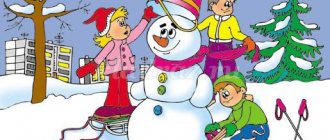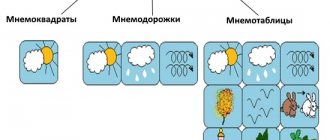Progress of the game:
The speech therapist creates a game situation with the following story: Once upon a time there were different sounds in one Sound State . When words began to be created, they had to go to their word homes. And instead of one sound “A”
many of the same
“A”
sounds .
They want to get together because they miss each other. Help the sounds come together . I will say 2 words each, and you clap your hands if the sounds are the same . To make it easier for you to find friends, I will pronounce them protractedly and loudly. First you need to say what sound I call loud in the first word, and then in the second word. After that, we will compare the sounds and be happy , if they are the same, we will clap our hands.
"The dolls got lost"
the sound in a word , pronounced with exaggerated intonation.
Progress of the game:
children are divided into 2 teams - perches and ducks. They move freely around the site. The presenter pronounces words alternately with the stressed sound U , then with the stressed O. The “perches” children must freeze when they hear a word with the sound O , and the “ducks” - when they hear a word with U. Those who do not stop on time are eliminated from the game . The winner is the one who never made a mistake and stayed on the court the longest.
Words for the game : hoop, vegetables, autumn, donkey, island, vacation, vacation, Olya, lake, sheep, order, cloud, corner, fishing rod, dinner, beehive, vacation, smart, coal, narrow.
"Friendly sounds "
Goal: to teach to recognize sounds pronounced with exaggerated intonation.
Types of didactic games used as a means of forming sound pronunciation
At each stage of sound pronunciation formation, the teacher uses a special system of didactic games. Didactic games included in the system are selected by the teacher so that they can be carried out in individual, group and frontal forms of organized activity.
Thus, when working with children on the formation of sound pronunciation, the following types of didactic games can be used:
- Didactic games aimed at developing cognitive processes: thinking, attention, memory and imagination, for example: “Who knows more?”, “Guess what has changed?”, “On the contrary”, etc.
- Didactic games aimed at mastering the skill of distinguishing non-speech sounds, for example: “Guess what instrument sounds?”, “Guess what rings?”, “Guess how many instruments sounded at the same time?” and so on.
- Didactic games aimed at mastering the skill of distinguishing speech sounds, for example: “Say a word with a given sound”, “Big and small bells?”, “Name a similar sound”, etc.
Finished works on a similar topic
Course work Didactic game as a means of developing sound pronunciation 400 ₽ Abstract Didactic game as a means of developing sound pronunciation 220 ₽ Test paper Didactic game as a means of developing sound pronunciation 250 ₽
Receive completed work or specialist advice on your educational project Find out the cost
In addition to the work carried out by the teacher, the work that is additionally carried out with the parents (legal representatives) of the children is also of great importance. The interaction between the teacher and parents on the use of didactic games as a means of developing sound pronunciation is aimed at expanding and enriching the experience of parents in the field of nurturing the sound culture of children’s speech, organizing didactic games for them, as well as with the aim of optimizing child-parent relations and establishing home traditions (for example, organization of joint didactic games on weekends).
Note 1
When organizing a didactic game for the purpose of developing sound pronunciation, it is important to choose the right form of gaming activity. The choice of activity form depends on the type of game and the assigned didactic task.
The main forms of activity when organizing work on the formation of sound pronunciation:
- Group form of work - all children and, if necessary, their parents are involved. The main activities for group work: open classes, joint leisure, parent meetings, holidays, etc. An important condition is that they all must include various types of didactic games.
- Individual forms of work - carried out individually with each child, the content of the work corresponds to the existing speech problems. This form of work can be organized in the form of a conversation or consultation, at which, in addition to the teacher and the child, a parent (legal representative) may be present. As practice shows, parents’ attendance at individual assignments gives positive dynamics in the development of a child’s speech and the direct formation of his sound pronunciation.
Thus, the formation of sound pronunciation in children can be carried out in different types of activities, which include didactic games. At the same time, the selection of didactic games must be carried out in such a way that they gradually become more complex, taking into account the pattern of children mastering the sound side of speech.





